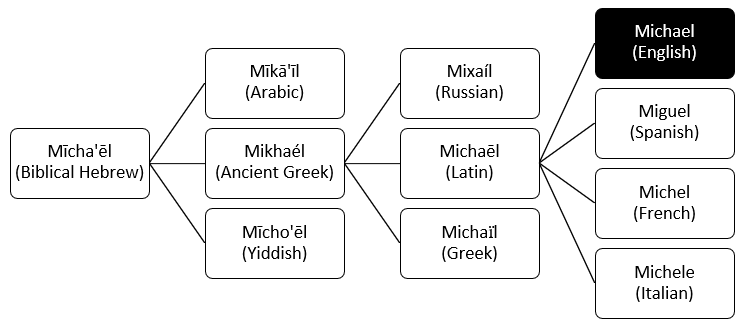
Michael, your name is so cool! It’s a rhetorical question, “Who is like El Elyon?”
When it comes to translating this name, we have a huge problem. This name isn’t translatable. Not directly, anyways. Elven names aren’t made from sentences. They’re made by combining nouns, adjectives, and name suffixes. Worse yet, this is a sentence, and we have no precedent for pronouns appearing in personal names. When it comes to translating this, I’ll make names that drop the “who is” part entirely. This is a poor solution, but there are no good solutions for this translation. I’ve seen a few different people try to mush together the words of the sentence to make the name, but Elven names just aren’t made that way, and I find the resulting names incomprehensible. I think that in this case, stepping away from the original meaning slightly is our only option for useable names.
This has a name within a name, so we’ll need to consider how to translate Ēl as well. I wrote an essay about this very problem: “Challenges in Translating Names from Our World,” but I’ll summarize the three approaches here.
- Cultural equivalent: replace El Elyon with Eru Ilúvatar.
- Translate the name-within-the-name: El means “a god.”
- Leave untranslated. In Elven languages it’ll sound like a word for “star.”
Quenya
The three approaches for translating El in Quenya are Eru, Aino/Vala, and Él. To these, we can add the adjective suffix –vea meaning “like,” making: Eruvea, Ainuvea, Valavea, and Elvea.
Adding a masculine name suffix we get: Eruveo, Ainuveo, Valaveo, and Elveo.
And since there are many feminine versions of Michael, here they are with a feminine name suffix instead: Eruvie, Ainuvie, Valavie, and Elvie.
As names of characters in an Arda context, none of these work, except the names based on Elvea because it sounds like the word “star-like.” This is too close to impersonating the divine. So instead, I suggest names based on the character’s relationship with the divine. The name is the name of an Angel, so I’m translating it as “servant of Eru/the Valar/the Ainur.”
In Quenya, the name suffix meaning “servant of” is –ndur. This makes the genderless names: Erundur, Ainundur, and Valandur.
Sindarin
The three approaches for translating El are Eru, Balan, and Êl. To these we’ll add the adjective suffix –ui meaning “like,” making: Erui, Balanui, and Elui.
Adding the word “Dîr – man” we get: Eruinir, Balanuinir, and Eluinir.
Adding the word “Dîs – woman” we get: Eruinis, Balanuinis, and Eluinis.
As with Quenya, only the names that sound like they mean “star-like” work as names for your RP and fanfic characters. We can add the word “Bŷr – vassal, trustworthy follower” to Eru and Balan to make: Eruvyr and Balamyr.
![]()
Michael, I hope you for this article informative and interesting!
If you’d like your name translated in this series, comment below and I’ll consider it for a future article!
Source:
Hanks, Patrick & Hodges, Flavia. A Dictionary of First Names Oxford University Press. 1990. pg 236.

Anna and Magdalena
I want to get a tattoo of Michael (my sons name) in elvish writing along with his birthday. It is very hard to translate into elvish I understand. I have tried lookink into the appendixes of Tolkiens books, but I am afraid my linguistical skills are not good enough.
I think you did a great job doing something incredibly hard, because you are right, this type of name is untranslatable. Still, I wanted to point out that the meaning of the question “Who is like God?” In the Hebrew cosmogony is that nobody is like God. That rhetorical question is like a sassy way to say that God is unparalleled and above everything/everyone else. So when we loose the “who is” and we translate this name into a construction made of God and like, we seem to be implying the exact opposite. I understand that this type of name is effectively untranslatable, particularly since Tolkien treated elvish names exclusively as descriptors of the person or their fate and never phrases, but I feel like as far as this name goes I would probably break those in-universe rules to make a name that is comprised of the phrase God is mighty or something like that.
I still want to repeat that this post is excellent work and that I really appreciate what you did, I just needed to mention this since that whole abramaic “nobody can be like God” vision is kind of a big deal in Tolkien’s worldview and in. LOTR lore. (Melkor literally tried to be like God)
That would change the perception of the name Michael a big deal. A villain could name himself “Like God” in Middle Earth whereas a devout person would not, which really needs to be taken into account if writers maybe were trying to translate the name Michael with the cultural significance it has for Christian/Jewish folks.